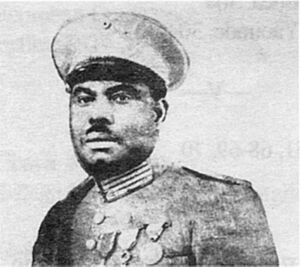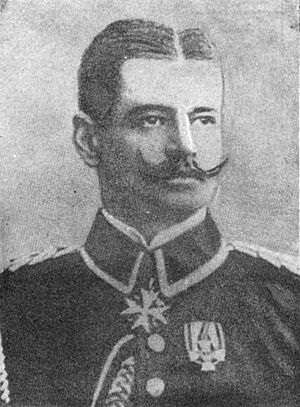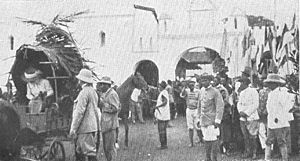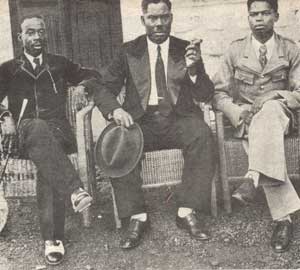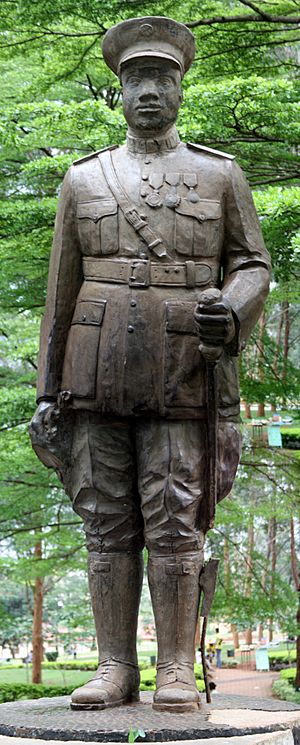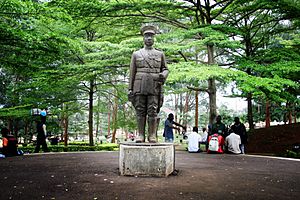Charles Atangana facts for kids
Charles Atangana (born around 1880 – died September 1, 1943) was a very important leader, known as a paramount chief, for the Ewondo and Bane people in Cameroon. This was during the time when European countries controlled Cameroon. His birth name was Ntsama, and the Germans, who ruled first, called him Karl.
Even though Charles Atangana came from a simple background, he became friends with European priests and officials. This helped him get important jobs in the government. He was smart and good at dealing with people, always willing to work with the colonial rulers. Because of this, he was made the paramount chief of the Ewondo and Bane groups. He was very loyal to the German Empire and even went with them when they had to leave Africa during World War I.
After a short time in Europe, Atangana came back to Cameroon. By then, the French were in charge under a League of Nations agreement. At first, the French weren't sure if they could trust him. But Atangana served them just as loyally as he had served the Germans, and he got his important chief position back. For the rest of his life, he helped his people adopt some European ways and worked to improve his lands. Even though the French reduced his power and some of his people were unhappy, he never fought against the Europeans. Instead, he worked with them, which helped him personally and, he believed, helped his people too. After he died in 1943, he was mostly forgotten. But since Cameroon became independent in 1960, people have rediscovered his story.
Contents
Charles Atangana's Early Life
Atangana was born between 1876 and 1885 in a small village called Mvolyé, which is now part of Yaoundé, Cameroon's capital city. His parents gave him a special "drum name" that meant "He who is known by the nations." He was one of twelve children. His father, Essomba Atangana, was a local leader for a part of the Ewondo people. His father died when Charles was about six years old.
Not much is known about Atangana's early childhood. Like other boys from his group, he would have learned how to fish, hunt, and trap. He also learned about his family's history and traditional wisdom.
In 1887, explorers from the German Empire arrived near his village. They were looking for a way to trade for ivory in the north. The Germans had claimed the Beti lands as part of their colony, called Kamerun, in 1884. By 1889, they had set up a permanent base in the area, which they named Jaunde (now Yaoundé). The Ewondo people first resisted the foreigners, but Atangana was probably too young to fight then. After some local leaders were defeated, the Ewondo resistance weakened. The Germans started choosing local chiefs and mayors to work for them. They also took young people to do simple jobs. Atangana was one of them, sent by his uncle to be a houseboy.
Ewondo people who learned German ways were highly favored early on. The German commander, Hans Dominik, sent four young men, including Atangana, to a mission school in Kribi, a town on the coast. There, Atangana learned German, history, geography, math, and the Catholic religion. A priest named Father Heinrich Vieter especially liked him. Atangana became the first Ewondo person to be baptized as a Catholic, and he took the Christian name Karl. His schooling finished just as another group, the Bulu, attacked Kribi in 1899. Atangana stayed safe in Douala with the priests until the German soldiers defeated the rebels the next year.
Starting His Career
In August 1900, Charles Atangana got a job as an interpreter for 500 Bulu people who were forced to work. He did this for six months and also worked as a nurse. Next, the Germans sent him to Buea to work as an office clerk. Around this time, Atangana met Marie Biloa and married her. They had two children, Jean Ndengue and Katerina.
Atangana was a very religious Christian and supported the church throughout his life with land and gifts. He was against some traditional Beti practices that mixed old beliefs with Christianity. He also opposed an Ewondo initiation ceremony called the Sso, and his efforts helped stop it in Beti society. In 1901, he helped the Catholic priests get land to build a mission in Jaunde. This opened up more of Cameroon to Catholic teachings. However, Atangana still supported traditional Ewondo customs about marriage. For example, he believed that a widow should stay with her husband's family until her family paid back the traditional marriage gift.
In early 1902, the German government made him their representative to the Ewondo people. He also worked as an interpreter and clerk for the Germans in Jaunde. His job was to organize a system for counting people (a census) and collecting taxes. He chose 300 local leaders to be tax collectors, and the Germans approved 233 of them. Atangana arranged for the collectors to keep 5% of the taxes, which made them very happy.
Hans Dominik became the commander of the Jaunde post in 1904. For the next six years, Atangana went with him on many trips to manage the area and explore. Atangana was a skilled diplomat. Once, he talked with a rebellious group called the Manguissa and prevented a fight between them and the Germans. Atangana helped set up German posts in many different places across Cameroon. The Germans usually kept their distance from Africans, but Dominik and Atangana became close friends, sometimes even eating together. Back in Jaunde, Atangana took on more important tasks, like overseeing a poll tax in October 1908.
In 1907, some people from the Mvog Ada group rebelled because Atangana was appointed their official interpreter. They even planned to poison him, but Atangana found out. He told the Germans, and on April 11, six plotters were killed and two were put in prison.
Dominik died in 1910. That same year, Atangana returned to Jaunde and got an administrative job, possibly as head of the Ewondo-Bane court. This court handled small legal problems and was how the Germans communicated with the people. However, he left this job when the head of his family group died. Atangana then became the headman of his family group and Mvolyé village.
In late 1911, Atangana traveled to Germany to teach the Ewondo language at the Colonial Institute of the University of Hamburg. He stayed there for about a year and wrote down Ewondo history and stories to be translated into German. His writings became known as the Jaunde-Texte, which is an important book about Ewondo history and culture. In 1913, he met Kaiser Wilhelm II in Germany and Pope Pius X in Rome. He returned to Cameroon the next year.
Becoming Paramount Chief
The Germans had found success in uniting different groups under single leaders called paramount chiefs. Atangana was chosen for this important position among the Ewondo and Bane people, either before or soon after his trip to Germany. This was first a temporary job, and his people were supposed to approve it a year later to make it permanent. But they didn't have many other choices, as Atangana was already the main person connecting the Germans to the local people.
All chiefs were expected to act and dress somewhat like Europeans, but Atangana seemed to truly prefer European styles. He worked hard to be the ideal administrator for the Germans. He wrote that to get close to the Germans, one had to "abandon the traits which displease them, to become their friend and then be valued by them." So, Atangana ate German food, started a 20-piece orchestra that played European-style music, and ordered a large, German-style mansion to be built. This big house project required building a brickyard and sawmill. People started calling him Mindili Ebulu, which meant "the man whose house is so large that it had a roof divided into nine sections instead of the two sections of an ordinary dwelling." The number nine is very important in Beti stories.
Atangana was careful about anyone who might try to take his place as the Germans' favorite. He wrote that some people tried to gain power through cheating, but the Europeans stopped them because they could tell who was truly loyal and honest.
Atangana won over other chiefs and leaders by giving them gifts, reducing their taxes, praising them, and helping them when they had problems. He treated visitors from other towns very well, letting them stay at his palace, use his horses, and enjoy big feasts. This not only flattered them but also allowed him to keep an eye on what they were doing and who they were talking to among the colonial authorities. His clerks in Jaunde kept him informed about both the Germans and his own people. Atangana became very wealthy. He owned workshops and sold food from five large farms to workers who were building railways.
The paramount chief also showed some loyalty to his people. He convinced the Germans to build roads, schools, health clinics, and churches. He also defended his people from harsh punishments by the colonial rulers. For example, an Ewondo interpreter once fired a gun during an argument with a German, which could have led to a long prison sentence. Atangana stepped in, and the man's punishment was reduced to carrying supplies. However, the paramount chief remained completely loyal to the governors. In 1914, for instance, representatives of the Duala leader Rudolf Duala Manga Bell tried to get Atangana to support a rebellion across Cameroon. Atangana kept the plot a secret but told the messenger to warn Manga Bell to rethink his plan.
Atangana's appointment as paramount chief annoyed members of the Bulu ethnic group. They worried they might lose favor with the Germans or, even worse, fall under the control of the Ewondo. This led to the 1912 Bulu uprising, led by Martin-Paul Samba, who was also trained by the Germans. The rebellion was crushed, and Samba was executed.
World War I and Beyond
World War I reached Cameroon in 1914. The city of Douala fell on September 17, and the Germans gathered their forces in Jaunde. Local informants told Atangana about the Allies' progress. When it seemed certain that Jaunde would be captured, Atangana prepared to escape with his German masters. He and the chiefs under him gave their positions to less important relatives so they could easily take them back if the Germans returned. They stayed in Jaunde until January 1, 1916, when British troops captured the town. The German soldiers and missionaries fled into the forest. Atangana, along with 72 Ewondo and Bane chiefs and 14,000–20,000 villagers (mostly soldiers and their families), led them through the forest. A Beti folk song, "Atangana Ntsama, the War Is Over," tells about this retreat and shows the conflict between those Beti who supported Atangana and those who opposed him.
They reached Spanish Guinea in February and surrendered to the Spanish, who were neutral in the war. The Spanish government gave the Beti people land to settle and agreed to take the Germans to the nearby island of Fernando Po. Atangana and his family went with them. In 1918, the Germans sent Atangana and six other chiefs to Spain. They were there to confirm that the Germans had treated their African subjects well. In September 1919, Atangana met King Alfonso XIII of Spain and asked him to support the Germans in these discussions. Atangana stayed in Madrid for two years and spent a month in Barcelona to get money he had saved.
Meanwhile, Ewondo lands came under the control of the French Third Republic as a League of Nations territory. Atangana, now known by the French version of his name, Charles, wrote to the French government to promise his loyalty and ask to return home. He was allowed to return in June 1920 and arrived in Douala on November 28, 1920.
Later Life and Leadership
Because Atangana had been so loyal to Germany, the French never fully trusted him. His first job under the new French rulers was to oversee groups of people forced to build roads in the town of Dschang. While Atangana was away, the French had appointed a Beti leader named Joseph Atemengue as their local representative in Jaunde (now called Yaoundé). However, Atemengue was never as popular as Atangana among the Beti people. Atangana tried to make an alliance with Atemengue by sending his 20-year-old daughter, Katerina, who was educated in Germany, to marry him. But she eventually ran away from the much older Atemengue and returned to her father. Atangana's good work convinced the French to let him return to Yaoundé in late 1921 or early 1922.
Soon after, Atemengue became chief of the local court, and Atangana was again appointed paramount chief (chef supérieur). He also got a seat on the Council of Notables, a group the French created to connect with their subjects and advise the government. Atangana set up his own council, like those he had seen in Spain, but it didn't do much, and its members weren't used to European-style government. It broke up in 1925.
The French gave the chiefs much less power than the Germans had. Atangana's main role was simply to make sure French rules were followed. A French governor wrote in 1917 that "the chiefs have no power of their own... There is only one authority: French authority." As a colonial administrator, Atangana was expected to collect taxes, help the French introduce cocoa and coffee farms, and get chiefs to find workers for these farms. In 1924, the French started a system to get food for Yaoundé and for railway workers. Atangana was responsible for getting the chiefs to collect the necessary food from farmers. Cocoa production in the South and Centre provinces increased even during the Great Depression, partly because of these efforts. He reorganized the chiefs and their duties and tried to make his people more "Western" by encouraging them to wear European-style clothes, use new building methods, and work to improve roads.
Most of the chiefs respected Atangana as their spokesperson and leader, and the Beti people generally looked up to him. A new system of status developed under his rule: a group of minor officials, messengers, interpreters, and office staff worked for Atangana and the other chiefs, separate from the French government. This group depended entirely on the chiefs. Atangana even set up his own private police force, known as the fulus in Ewondo. This whole group knew they relied on the chiefs and gave them loyalty in exchange for protection and pay. The chiefs, in turn, relied on these officials to quickly carry out their duties for the French.
However, the Beti people generally disliked the French forced labor and taxes. Some people ran away to the bush before the tax collector arrived. Others avoided taxes by saying their wives were out-of-town visitors or waiting until the last minute to pay, which reduced the collector's share of the tax money. If enough taxes weren't collected, Atangana himself was expected to make up some of the difference. To deal with these small rebellions, chiefs could punish their subjects with 15 days in jail or 100 franc fines without a proper trial. This was meant for specific offenses, but Atangana and other chiefs used it for all sorts of difficult behavior. Atangana and his sub-chiefs were expected to discipline these difficult subjects. He put constant pressure on the sub-chiefs, who then put constant pressure on the villagers to pay taxes and provide workers.
Despite these challenges, Atangana's wealth continued to grow. In 1922, his salary was 6,000 francs per year, and by 1938, it had risen to 24,000 francs per year. Atangana also received 2% of all taxes collected by lower chiefs, pay for his legal role, and money for organizing road construction. People have said that as early as 1924, he owned huge farms with large areas of cocoa, palms, food crops, and many animals. While these numbers might be a bit exaggerated, Atangana was definitely a very rich man. By 1926, he owned two trucks and a car, which he used to transport goods from his farms. By the 1930s, important chiefs like Atangana could earn more than 400,000 francs per year just from collecting taxes.
By the mid-1920s, the 278 Beti chiefs under Atangana's control began to oppose his leadership. His control especially weakened among the Bane people. In 1924, the Bane filed a complaint against Atangana in court, saying, "We work always and it is Atangana who receives the money. For all the things that we have sent to the Europeans, such as chickens and eggs, through Atangana, we have received nothing." They planned to choose their own paramount chief and turn the common people against Atangana. The French arrested the plotters for refusing to pay taxes and provide workers. This left Atangana still head of the Bane, but his influence was greatly reduced.
In 1925, the French reduced the number of Beti chiefs to 40 and took the chiefs of Yaoundé out of Atangana's direct control. However, in 1928, the Yaoundé chiefs were seen as troublesome and unable to do their jobs, so Atangana was once again put in charge of them. In 1929, he wrote a book about traditional Beti society. In it, he tried to hide his simple childhood by calling himself "King" and claiming to be descended from a made-up line of Ewondo royalty. By the end of the 1920s, he was the head of perhaps 130,000 people, the chief of Mvolyé village, and the supervisor of eight regional chiefs and 72 village chiefs. In reality, his position was mostly about prestige, with little actual power.
Collecting taxes and finding workers became harder as the decade went on. This was because people could find paying jobs in Yaoundé and on the farms. Atangana's 1938 plan for reorganizing Yaoundé's government shows how frustrated he was: "The local people do not know what endurance means... [and] work with ill-will for the administration or for private concerns, where they seek refuge as a safeguard when the administration gives the chiefs an order in the public interest or for their own good." He also complained that "Notables, with their diminished influence, are almost inert in relation to the growing number of their recalcitrant subjects" and suggested that a chief could hardly control more than 5,000 people. Atangana isn't even mentioned in a French report about their African leaders from 1939. However, he kept the right to announce the appointment of new chiefs and to claim that both he and the French had chosen them.
Atangana traveled often during the French colonial period. He made sure to attend his people's weddings and funerals. He also had more chances to visit Europe, including the Paris Colonial Exposition in 1931 and the French Colonial Conference in 1935. In 1938, his wife died. Atangana was considered handsome by Ewondo standards: strong, well-groomed, and known as a good fighter, dancer, and husband. He remarried on January 6, 1940, to Julienne Ngonoa, a young Beti woman. She had two children with him: Marie-Thérèse and René Grégoire. Atangana seemed to follow Catholic rules against having many wives, even though other Beti chiefs at the time had hundreds of wives.
In his later life, Atangana worked to support public health, such as getting rid of sleeping sickness. He never supported expanding Cameroon's public school system because he believed that educated people might one day challenge his rule. Atangana's health started to get worse in August 1943. He died on September 1, 1943, in Mvolyé, Yaoundé.
Charles Atangana's Legacy
No one took over as paramount chief right after Atangana died. His grand palace was left empty and fell into ruins. However, traditional Cameroonian chieftaincies (leadership roles) were brought back on July 11, 1977. By the 1990s, Cameroonian ethnic groups had revived these old traditions. Atangana's daughter, Marie-Thérèse, became the new Ewondo paramount chief. In December 2000, she began renovating his palace in Efoulan, Yaoundé, a project that was estimated to cost 150,000,000 francs CFA.
The colonial system that Atangana supported caused many problems in Cameroon. Production focused on making chiefs rich, attracting foreign money, and supporting the colonial government. Only infrastructure that helped transport and export cash crops was built. Despite this, Atangana's story became part of Beti folklore. For example, Beti storytellers told his tale in oral poems and songs that could take a whole night to recite. His legacy was mostly forgotten by the country between his death and Cameroon's independence. However, after Cameroon became independent in 1960, scholars rediscovered his story. Charles Atangana Avenue in downtown Yaoundé is named after him. A statue of him stands on a nearby hill, which had fallen into disrepair by 2000.
See also
 In Spanish: Charles Atangana para niños
In Spanish: Charles Atangana para niños


